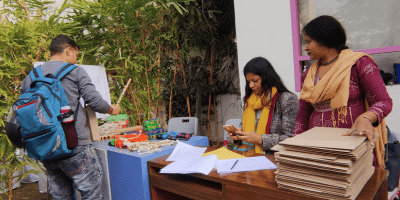Wellbeing Rituals To Support Your Mental Health Wellbeing Rituals To Support Your Mental Health
Post By
The Wellbeing Project Team
Welcome to a world where mental health takes center stage, and every step forward is a cherished milestone on our wellbeing journey. As we commemorate Mental Health Action Day 2023, join us on a heartfelt exploration of our team’s daily rituals—a tapestry of unique paths that nurture our minds, bodies, and spirits. Witness the transformative power of self-care, inspiring you to embark on your own wellbeing journey towards resilience, purpose, and lasting joy:

Walking in nature, writing, reading books, inspiring quotes or poems, spending time with friends or family, and laughing!
I value knowing that I’m part of something bigger than myself, whether it be my purpose in life, the world that surrounds me, or part of a community like my friends or family.
– Alejandra Garza, Networks Advancement Manager
Connecting with nature.
Nature grounds me and reminds me that we are all interconnected . As I reflect on the beauty of the natural world I feel a sense of awe which allows me to understand that I am part of a bigger ecosystem and everything is they way it’s supposed to be. Only then I am able to let go, to surrender.
– Silvana Cisneros, Networks Lead


Activities that help me enter the flow state include listening to music, riding my motorcycle, going for a nature walk, chopping vegetables or cooking, pruning shrubs, enjoying a private moment with my comfort food, birdwatching and sitting out in the balcony looking at falling leaves. Additionally, conversations with friends and family in my innermost circle also play a significant role in helping me stay centered.
Engaging in flow-state activities allows me to focus on something other than the pressing problem, which frees my mind to concentrate on finding solutions in the background. This helps me mentally unwind and serves as a reminder that there is so much more to life than just the current situation I’m in. Conversations with my friends and family help me to think more clearly about dominant thoughts as they challenge me with provocative questions and different perspectives.
– Anubha Agarwal, Research & Learning Manager
Sleep well, eat healthy, manage money wisely, have meaningful relationships and be mindful as much as possible of every moment I am alive.
It helps me to tave a positive and optimistic attitude.
– Ricardo Paz, People & Culture Elder


Baking.
Baking allows me to focus my attention on the present moment. The process of measuring ingredients, following a recipe, and mixing them together requires concentration and mindfulness. It also engages multiple senses, including sight, smell, taste, and touch. The process of working with ingredients, observing the transformation in the oven, and savoring the final product can provide a sensory experience that is both pleasurable and stimulating.
Besides, I think baking is a form of creative expression that allows me to experiment with flavors, textures, and decorations. It provides a space to showcase my imagination and personal style. The act of creating something delicious and visually appealing can definitely boost my mood and provide a sense of accomplishment.
Finally enjoying homemade treats help me to evoke positive memories, evoke nostalgia, and provide a sense of emotional comfort.
– Fernanda Martínez, Networks Manager
For me it is important to recover energy: time for fun and sharing moments with family and friends, good sleep, yoga and meditation. Time spent in this way re-energizes me.
It helps me to take a positive and optimistic attitude.
– Valeria Peredo, People & Culture Lead


Weekly calls with my closest and dearest friends. They are usually not update calls, rather proper conversations, long, honest, fun at times, painful at others, the same I would have if we were leaving in the same place and see each other regularly. I think the most special aspect it’s that they have been weekly rituals for almost 15 years.
Long term friendship are an incredible gift because your friends are also your memory, your mirror, your diary. And you’re the same for them. You grow up, and old, together, sharing different live stages and milestone events. They are your net, your chosen family, you are never lonely, nor lost if you can count on such meaningful relationships, no matter what happens.
– Alessandra Gatti, The Wellbeing Summit Director
Meditation, contact with nature, physical activity, art, time with family, and friends.
It keeps my feet on the ground to bring down my head (mental activity) into my body and soul
– Eugenia Di Fiori, Organisational Exploratory Program Manager


5 minutes of morning meditation.
It helps me settle the energy for the day.
– Beatriz Retamar, Leadership Assistant
As we bring our exploration of daily wellbeing rituals to a close, we invite you to carry the torch of self-care and mental wellness forward. Let our stories serve as a reminder that your wellbeing journey is unique and deserving of celebration. Embrace the power of rituals that nourish your mind, body, and spirit, and surround yourself with a compassionate community that uplifts and supports you.
Remember, cultivating mental health is an ongoing process—a lifelong commitment to self-discovery and self-care. As we honor Mental Health Action Day 2023, let us ignite a collective spark, encouraging conversations and actions that prioritize mental wellbeing in all aspects of life.











































